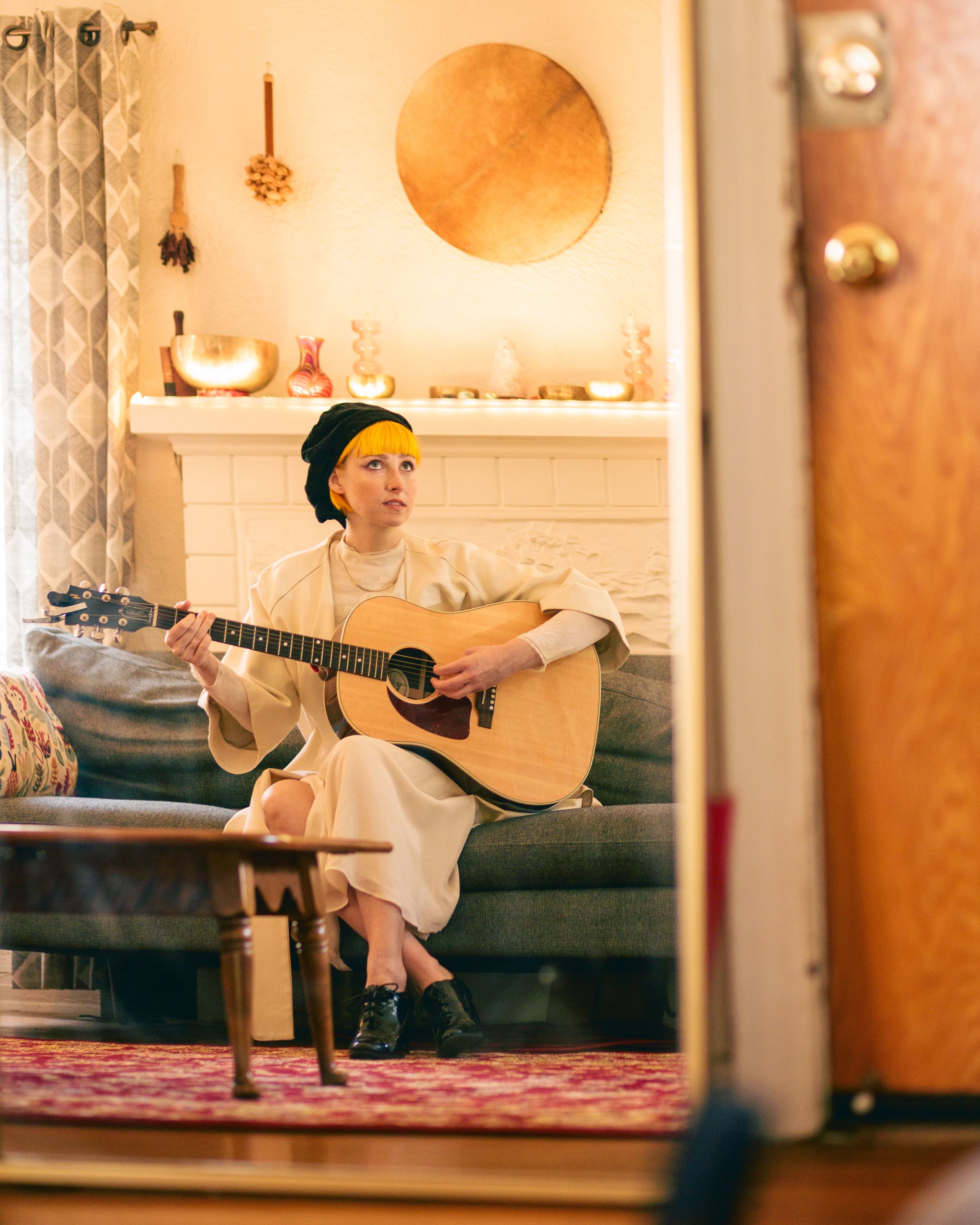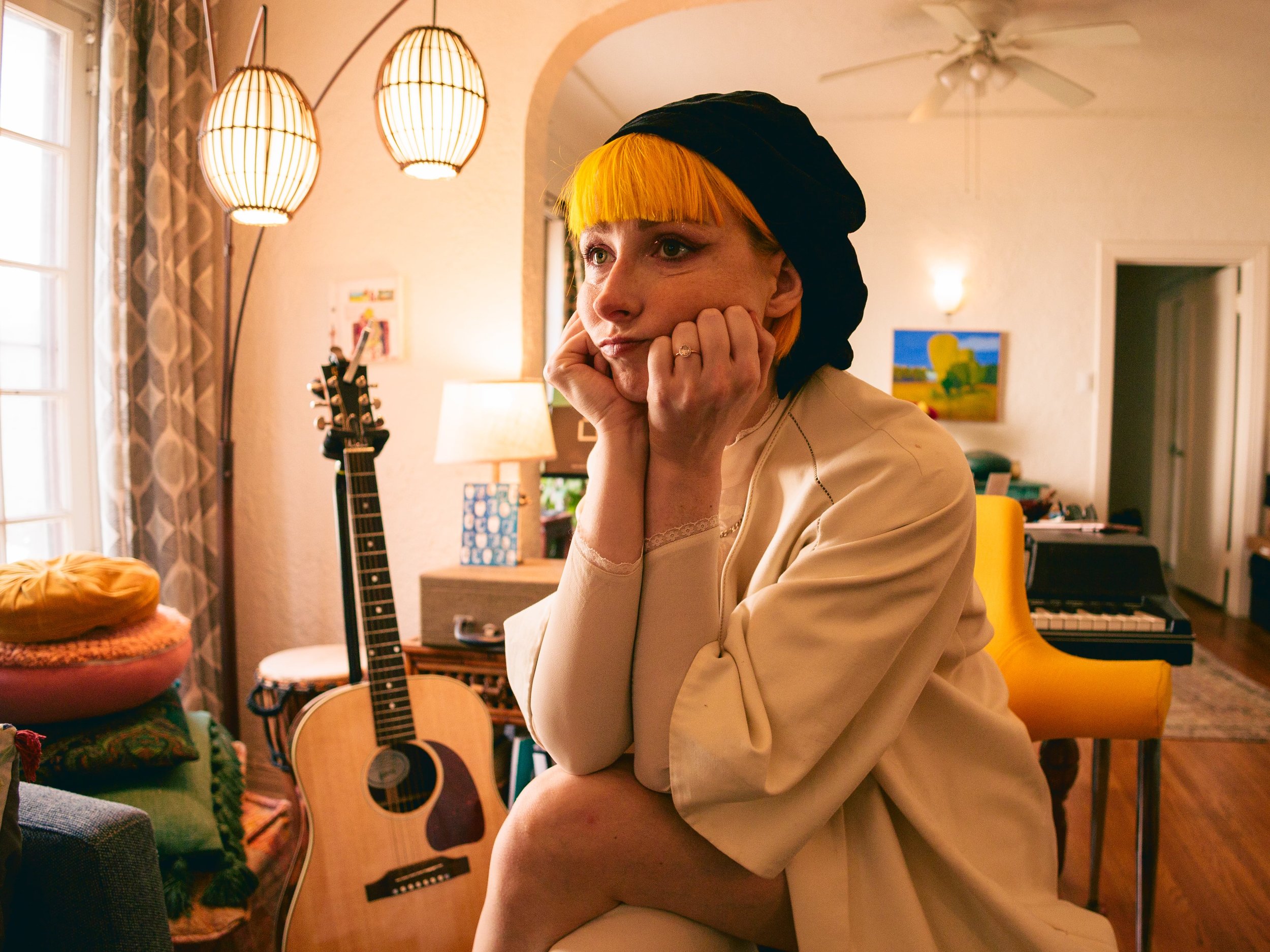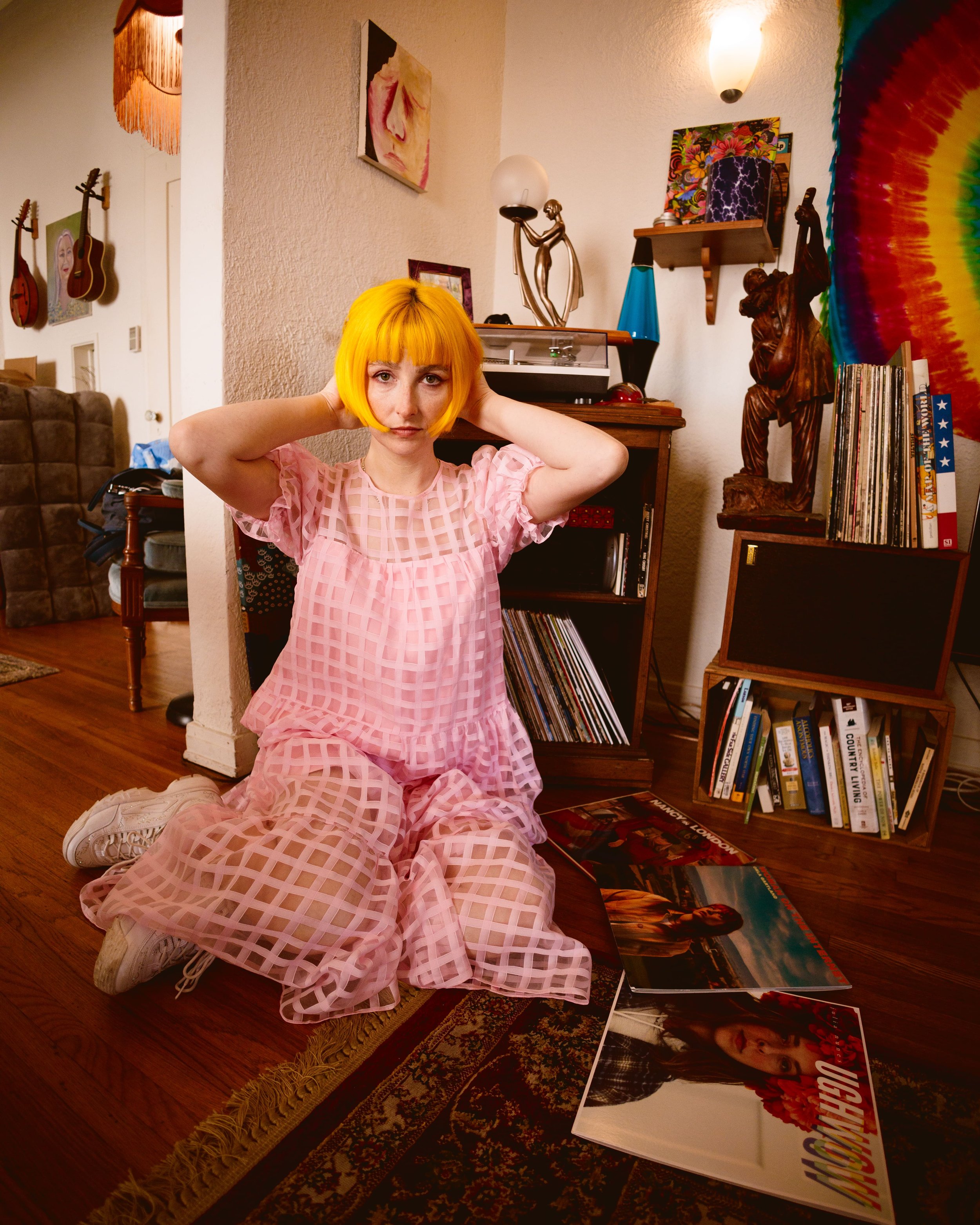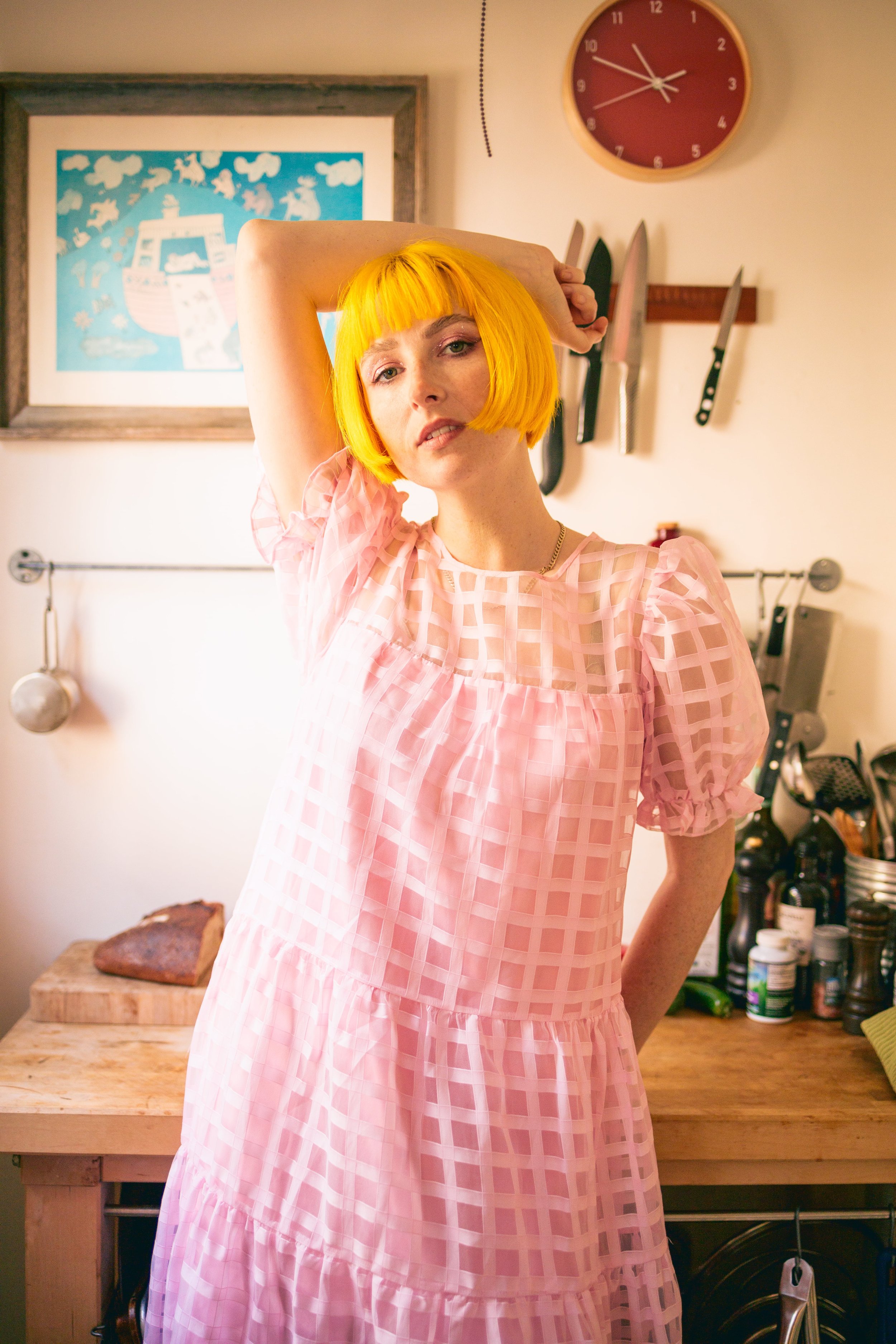Tessa Violet: Rooting for Herself
⤏ MUSICIAN TESSA VIOLET ON FAILURES, GROWING FROM YOUTUBE, AND WHY SHE’S NOT A PERFECTIONIST
⤏ IN CONVERSATION WITH GISSELLE PERNETT
⤏ PHOTOGRAPHY BY JON DEL REAL
Tessa Violet is always doing her best. From her early days on YouTube to being full swing into her (yes) mom era, Tessa has grown into herself embracing delusion, having a lot of hope and —on her best days— knowing that failure is just a part of her journey. Her latest album, “My God!” is just another reminder of how powerful you can be despite heartbreak, and insecurity. In the middle of her living room floor, Tessa and I talk about writing, healing and why sharing her feelings doesn’t make her vulnerable.
GISSELLE PERNETT: How much of a role did music play in your life before it became your career? Were there any albums, songs or artists that were your gateway into music?
TESSA VIOLET: I want this not to be the answer. I feel like it's a much cooler answer to be like, “Yes, I was into indie bands all along. It's always what I loved. It's always been my passion.” But the truth is that I grew up in a very small town. The idea of a live music scene was just so far removed from my lived experience. It just wasn't on my radar as something that not only could you do, but that you could be a fan. So musical theater was my gateway into music and listening to my mom's CDs. She had a Boyz II Men cassette tape that we jammed to every day in the car, a lot of Frank Sinatra and a lot of Starbucks compilation jazz music.
It wasn't until I was a young adult that a friend was like, “Are you into music?” And I was naming all these musical theater soundtracks and they’re like, “I don’t really mean that.” They gave me [recommendations like] Miniature Tigers, Tell it to the Volcano and HelloGoodbye’s Would it Kill You. But this was sort of my exposure to the concept that you can literally just write a song. I was 23 when I wrote my first song because someone left their guitar in my car. Then I started learning how to play and I was like, last week I couldn't play any songs and now I can. Maybe I could write a song too. Then I did and it unlocked that part of me. This is the only thing I’m focused on and the only thing I want to do.
GP: My God! Took you four years to write. What was that journey like? Did you feel any sort of healing or growth from the end of it?
TV: Yeah, definitely. The idea of the last record [Bad Ideas] was about getting sober. Then after that record came out, I moved to LA and “Crush” was a huge success for me and navigating this new experience of being in LA but feeling very insecure. When I first moved, I was going to parties and I got to talk to people. [I was] finding myself and learning to love. [For] the writing of My God!—I wrote all the sad songs because I went through a breakup. Then on the other side of it I was like, “Okay, enough is enough.” My now finance, friend at the time,—he had known me through three or four boyfriends at that point—said, “Every time you break up with someone you’re like a phoenix rising more powerful than ever.” I loved that. I wrote that into “YES MOM.” I just sort of found myself, loved myself and wanted to write about it. I wanted to write about feeling powerful and being powerful.
GP: What was your favorite song to write on this album? And what was the most challenging one?
TV: My favorite song to write was, “I Don’t Know Who I Am Without You.” It’s the only song I’ve ever written where the entire melody came first. I had a melody but no lyrics or concept and I never write songs that way. This melody was coming to me and I was trying to shoehorn concepts into it. So I had that melody for a year and then one day it just came to me. It spilled out of me. The most challenging songs to write were “Bad Bitch” and “Play with Fire.” My friend Rusty Clanton once said to me, “Writing songs is terrible. Having written is amazing.” You’re like, “God this is terrible. Will this ever work out? It would be so much easier to be doing anything else.” All of the songs The Fund [producer] works on me with they’re like, “Can we please be done?” And we can’t be done until it’s finished, we’ll know when it’s finished. It’ll feel right when it’s finished.
GP: Do you think you’re a perfectionist?
TV: No, because I put things out. To me the qualification of a perfectionist is they don’t finish things because nothing’s ever perfect. I would say I’m not a perfectionist but I want things to be right. Other people would maybe call me a perfectionist. I know when I’ve done my best. I’ve become a much better vocalist since the last record and with Bad Ideas, I wouldn’t say any of those vocals are perfect but that’s the best I can do. I’m putting it out because I’m proud of these songs and I did my best. It always feels good to be able to sign off on it being the best I could do. It feels really bad to know that you bailed out because you were tired of working.
GP: Wow, you’re so right about that. You’ve been through a couple transitions in your life from modeling, vlogging and now music. Did music always feel like the most obvious choice?
TV: I knew I wanted to sing on stage. That was always true. That was my first heartbreak was coming to terms with the fact that I am not a very good actor. So musical theater was not in the cards for me. Then when I found songwriting, it just like it clicked into place. If I write my own songs, there is no audition and no one can stop me. That felt like a really long arc of something coming to fruition and a hope fulfilled. Of course this is what I was supposed to be doing. Laboring until something is right? I love that. Songs are 3 to 5 minutes long and that’s a little episode but then you have the album which is the whole story.
“It always feels good to be able to sign off on it being the best I could do. It feels really bad to know that you bailed out because you were tired of working.”
GP: How different does YouTube Tessa feel from My God! Tessa?
TV: I just know myself now. I didn’t know myself then. Older people who would see how much anxiety I had would say, “Just be yourself” and that would be infuriating to me. How can I be myself? I don't know who I am. But I would also be like “I am myself. I'm anxious right now. That is me. That is what I am feeling.” Now I'd say, “That's not who you are. That's just what you're feeling.” It's ok to feel that way, but that is not who you are. I've come into myself and the parts of me that are the same are the parts that love to play. I love to be creative. I love to go on adventures. I want other people to feel empowered and joy and appreciated for their labor.
I used to be a pessimist, but I'd call myself a realist because everything ends. Now I’m an optimist. I always have hope but early only it was too painful to hope because to hope was to be open to being devastated. But now I know if you don’t let yourself hope you never get to experience hope fulfilled, which is the most fun and not hoping doesn’t actually save you from devastation. You spoil the joy you have in the moment by always being worried of what if the other shoe falls. It will. Just be okay with that. Enjoy what’s here right now. When it comes to my relationship with myself more and my mom era, I’m rooting for me, I’m taking care of me and I know me pretty intimately. The way a mom would know their child.
GP: That’s such a beautiful way to put it. One of my favorite things you’ve shared is the meeting you had with a manager and you said “their lack of ability to see I have potential does not mean I don’t have potential.” You’ve also said being an artist means being delusional. Being in an industry where acceptance and relevance is super important, how did you learn not to take failures personally?
TV: That's not the manager I work with [now], that was someone I had an interview with early on. He would want that to be clear because he would never say that. To say that I handle it with grace and let everything roll off my shoulders like it's water and I am rock would be a lie. Some nights I’m literally crying because of TikTok. But when I'm in my best, most elevated self, I just believe that this is not the end of the story because I had a failure today. That's not the end of my story. I'm on my journey. Challenge and failure are a part of the journey. So I just reframe it as I'm in a valley right now but peaks will come as I've experienced them before. I’ve had highs so I know that’s a part of life too. And everytime you fail at something, it’s just an opportunity to learn something. That’s how I handle failure when I’m at my best self.
GP: And when you’re at your worst self?
TV: Crying [laughs], being like, “Why am I uncompelling?” and comparing myself to other artists. Why do they sell out their shows right away? It's just a part of the journey.
GP: On the topic of songwriting, your song “My God!” had actually been in the works since 2020 but was shelved. How do you know when to come back to those songs? How do you get out of that songwriting rut?
TV: That chorus came to me alone in my room. “My God!” is also the song that has the most writers on it because I kept bringing it into different rooms. [I would bring] this chorus idea then we’d write a little bit more and finish the song but I’d be unhappy with the rest of it. [I would] keep this nugget from this session and bring it to another and just keep building. I just always felt like that chorus fucking slammed. When parts of a song feel so right, I just don’t give up on it.
GP: Since we’re talking about songwriting and bringing in different writers, I think artists get heavily critiqued when there’s a lot of writers credited to one song. How does that feel from the perspective of a musician?
TV: I cannot control what people think, decide or feel so actually, here's the truth. I used to feel like I didn't want any co-writers because I want people to know that I wrote everything and all these ideas came from me. Big ego. On this record, [Bad Ideas] the only co-writer I have is on “Crush.” And “Crush” I had mostly done but no chorus except for, “But I could be your crush.” I didn't know where it went from there. I had these two friends who I loved their songwriting and very vulnerably I came to them and I was like, “Will you help me finish this song?” Obviously it was the hit so I’m like, “I should do more co-writing [laughs.] I thought when I was going to be in a room with other writers that we were all going to write a song that we liked as a group the best.
Now I know that's not true. I'm the captain of the ship. Everyone's pitching things to me. [For] “My God!,” I had a chorus and I knew I wanted to write about something sexy. I always wanted to write a song with Bonnie Mckee, who is a fantastic pop writer. And I got to [write] with Bonnie. When someone says something, it also sparks something in you. You're bouncing off each other. Part of me still has an ego and everyone needs to know that I'm a writer. But whatever I wrote a lot of these songs and not all of these are co-writes.
“If you don’t let yourself hope you never get to experience hope fulfilled, which is the most fun and not hoping doesn’t actually save you from devastation. You spoil the joy you have in the moment by always being worried of what if the other shoe falls.”
GP: Songs like “Bad Bitch” and “YES MOM” come from not wanting to talk negatively about yourself and not wanting to keep writing heartbreak songs. But I think “Good Things Go Bad” captures that feeling of sometimes it's easier to be sad.
TV: It’s safer to be sad or you perceive it as safer. That one I wrote by myself. You think that you're protecting yourself from disappointment but you're not. You're just spoiling the present moment.
GP: You mentioned your last album was about sobriety and this one feels more positive. Does vulnerability come easy to you?
TV: Yeah. It doesn't feel vulnerable to me. I don't feel vulnerable sharing intimate details of what I think or feel. And I always felt that way. When I used to talk about anxiety in early 2010, not a lot of people were talking about that and people were like, “This is so vulnerable.” Why? I am not the only person who feels this way. I just know that for a fact.
GP: What does songwriting look like when you’re trying to process emotions like processing a breakup or processing your sobriety?
TV: I believe that songs already exist when you're a songwriter. You're just channeling it. So it's about being open enough to let it come through. Your opening is specific to you. A song can come through to you and be different than when it comes through another writer. For me, when I'm writing, I will cry when something is right. A happy thought or sad thought when it's right, it brings me to tears because that is a barometer to find truth. It's all about trying to find truth.
GP: Do you have any inspirations both in your personal life and in music?
TV: To be honest, I just feel very inspired by myself. I'm always like, “What more? What else?” I feel inspired by the people around me. My friend Julia Nunes, I feel inspired by her. She has a lot of wisdom. I think my mom's cool. My mom doesn't really care what people think about her. Or it's not that she doesn't care but my mom accepts herself for who she is in a way that did not come naturally to me.
GP: Do you feel like you've gotten to that point of not caring about what people think about you?
TV: I want everyone to like me but not more than I want to be who I am. I used to tell myself a lie that I liked everyone. If I didn't like someone I would weave a story [because] to not like someone felt like a moral failing on my part. I have a belief that if I say no to someone then they won't like me anymore. And then there's this fear of what if I'm all alone in the end? I need people to like me. It really triggers that within me. If I had a stronger sense of saying “No” to someone and they're going to be okay and I'm going to be okay then that wouldn't be triggering to me. All that to say, when I don’t like someone it’s really all about my bullshit and when people don’t like me, it’s their bullshit.
GP: You have such a really nice way of thinking about things. What is the best part of your life right now?
TV: Dante. I love him so much. I feel like I can be who I am with him and I feel like he can be who he is with me. I love who he is and he loves the best parts of me. He accepts the worst parts of me and I feel the same about him and that feels really good too. The experience of being an artist, releasing something and putting out something you've worked on for so long is an emotional roller coaster. So it's not the easiest thing to be with someone who's having these big highs and then the next day a low, low. It's a lot and I —especially this past month and a half— have been working all day. Every day. And I feel really supported, really encouraged, really seen and taken care of. I want that for everyone. I hope that everyone gets to have a love like ours because it makes me feel so happy.




